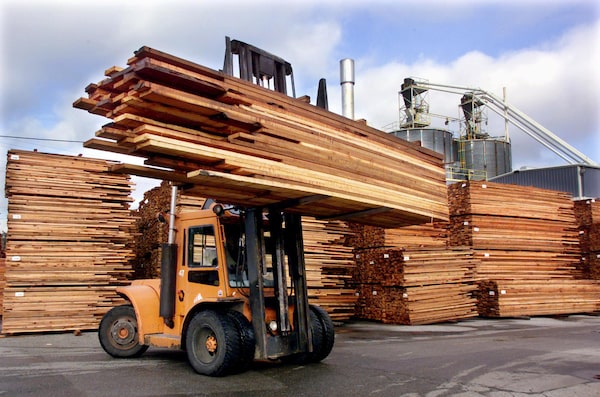
In the first half of this year, producers in British Columbia sent softwood worth $1.5-billion to the United States, compared with $2-billion in the same period last year. (File Photo).CHUCK STOODY/The Canadian Press
The value of B.C. softwood shipments into the United States has plunged 25 per cent as American duties and lower-than-expected home construction south of the border reduce demand.
In the first half of this year, producers in British Columbia sent softwood worth $1.5-billion to the United States, compared with $2-billion in the same period last year, according to trade data compiled by the B.C. government.
The volume of lumber exports has also tumbled, with 6.9 million cubic metres of B.C. softwood sold into the U.S. in this year’s first half, down 10 per cent from the same period in 2018.
The slump in exports to Canada’s largest trading partner underscores the tough times faced by B.C. lumber producers, including Canfor Corp. The company is the target of an unsolicited $981.7-million bid by Vancouver billionaire Jim Pattison to take it private.
Undaunted by industry downturns, the 90-year-old Mr. Pattison has a long history of investing for the long term and weathering tough economic times. "Jim Pattison isn’t just looking at 2019. He’s looking out to 2025, 2030 and 2050,” RBC Dominion Securities Inc. analyst Paul Quinn said in an interview on Tuesday. “He sees lot of value and knows what’s going on. He’s fully cognizant and believes that we’ll be in better markets and the value of Canfor will be higher.”
In the first half of this year, Vancouver-based Canfor paid $81.5-million in softwood duties imposed by the U.S. Department of Commerce. Those duties hurt the company in the first six months, when it lost $138.1-million, compared with a $282-million profit in the same period in 2018.
Spring flooding in the U.S. South delayed residential construction and contributed to slower-than-forecast American housing starts. Industry analysts say U.S. duties on softwood from Canada are effectively incorporated into bills paid by American home builders, which in turn pass on the higher costs to consumers.
Analysts say that makes U.S. softwood more attractive to those builders, with American lumber producers gaining market share as a result of the Trump administration’s ruling that Canadian softwood is being subsidized and dumped south of the border.
The combination of excess supplies and dampened demand has translated into lower prices for lumber products. The price for benchmark two-by-fours made from Western spruce, pine and fir averaged US$353 for 1,000 board feet in the first half of the year, down 36.5 per cent from US$556 in the same period last year, according to Random Lengths, a U.S.-based company that monitors wood prices.
“It will not be until 2020 before a better supply/demand balance occurs to raise prices,” Russ Taylor, managing director at wood research company Forest Economic Advisors Canada, said in an August report.
After slapping preliminary duties in April, 2017, the U.S. Commerce Department started in early 2018 to impose the highest final duties against three B.C.-based producers: 23.56 per cent against West Fraser Timber Co. Ltd., 22.07 per cent on Tolko Industries Ltd. and 20.52 per cent on Canfor. Most other Canadian producers pay the weighted average of 20.23 per cent.
In the long-running Canada-U.S. softwood dispute, the U.S. Commerce Department says most provinces provide subsidies by charging unfairly low stumpage fees to Canadian producers, which pay for the right to chop down trees on Crown land. Under the American system, most producers pay for U.S. timber rights on private land.
Canada vehemently disagrees with the U.S. position of injury to American producers, and hopes the duties will be cancelled under the North American free-trade agreement’s Chapter 19 dispute-resolution mechanism.
B.C. producers have been able to diversify by exporting softwood to China, but those shipments are down from record levels in 2013. In the first half of this year, B.C. saw $482.6-million worth of lumber shipped to China, up 6 per cent from the same period in 2018 but down 23 per cent compared with the first six months of 2013.
Canfor, Canada’s second-largest lumber producer, is among the B.C. forestry companies keen to increase shipments to China. Others include West Fraser, Tolko, Interfor Corp. and Conifex Timber Inc.
West Fraser, Canada’s largest lumber company, has the financial ability to mount a rival bid for Canfor, though analysts say that is unlikely.
Mr. Pattison, through Great West Capital Corp., owns 51 per cent of Canfor. Great West has offered $16 a share in cash for the 49 per cent of Canfor shares that are widely held.
“Institutional ownership is quite widespread,” CIBC World Markets Inc. analyst Hamir Patel said in a research note. “An organized effort demanding a higher bid may not emerge. With the offer not subject to financing or due diligence, we see little risk of the offer being withdrawn.”
British Columbia is Canada’s largest lumber exporter into the U.S., with a 48.3-per-cent share of sales volume last year, followed by Quebec (19.2 per cent), Alberta (12.2 per cent), Ontario (9.3 per cent) and New Brunswick (7.4 per cent).
 Brent Jang
Brent Jang